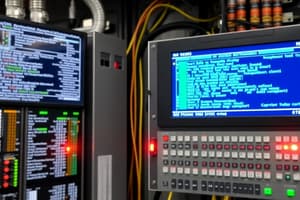Podcast
Questions and Answers
What is the most popular programming language used for programming PLCs?
What is the most popular programming language used for programming PLCs?
Ladder logic
How are ladder diagrams structured in PLC programming?
How are ladder diagrams structured in PLC programming?
Ladder diagrams are made up of rungs that represent components like switches, coils, and relays.
In what industries are PLCs widely used?
In what industries are PLCs widely used?
Manufacturing, energy, and water management
What is the role of SCADA systems in industrial automation?
What is the role of SCADA systems in industrial automation?
What are the benefits of integrating PLC and SCADA systems?
What are the benefits of integrating PLC and SCADA systems?
What is the role of the Human-Machine Interface (HMI) in SCADA systems?
What is the role of the Human-Machine Interface (HMI) in SCADA systems?
How does the integration of PLC and SCADA systems improve industrial processes?
How does the integration of PLC and SCADA systems improve industrial processes?
Flashcards are hidden until you start studying
Study Notes
Industrial Automation Using PLC and SCADA: PLC Programming
Overview and PLC Functionality
Programmable Logic Controllers (PLCs) are the backbone of modern industrial automation, replacing relay-based systems with a compact, programmable, and versatile solution. PLCs are designed to execute real-time control tasks, responding to input data from sensors and sending control signals to actuators. They are built to be rugged, reliable, and capable of operating in harsh industrial environments.
PLC Programming
PLCs are programmed using a variety of languages, the most popular being ladder logic, a graphical representation of electrical circuits that closely mimics relay logic. Ladder diagrams are made up of rungs that represent components, such as switches, coils, and relays, enabling engineers to create complex control strategies visually.
PLC Applications
PLCs are widely used in various industries and applications, including manufacturing, energy, and water management. They control individual devices or small-scale processes, executing real-time control tasks based on the control logic defined in the program.
PLC and SCADA Integration
While PLCs focus on real-time control tasks, SCADA (Supervisory Control and Data Acquisition) systems provide a higher level of data acquisition, processing, and analysis for large-scale industrial processes. By integrating PLC and SCADA systems, the benefits of real-time control and data analysis are combined, enabling more efficient and effective management of industrial processes, as well as improved decision-making and process optimization.
SCADA Systems and HMI
SCADA systems include a Human-Machine Interface (HMI) component, which serves as the primary point of interaction between the SCADA system and its human operators. The HMI provides a graphical representation of the industrial process, allowing operators to monitor and control complex systems in real-time.
The integration of PLC and SCADA systems, with their complementary strengths, enables more efficient and effective control and monitoring of industrial processes, as well as improved decision-making and process optimization. This integration allows for better coordination between various parts of the industrial process, improving overall operational efficiency and enabling better resource utilization.
Studying That Suits You
Use AI to generate personalized quizzes and flashcards to suit your learning preferences.




